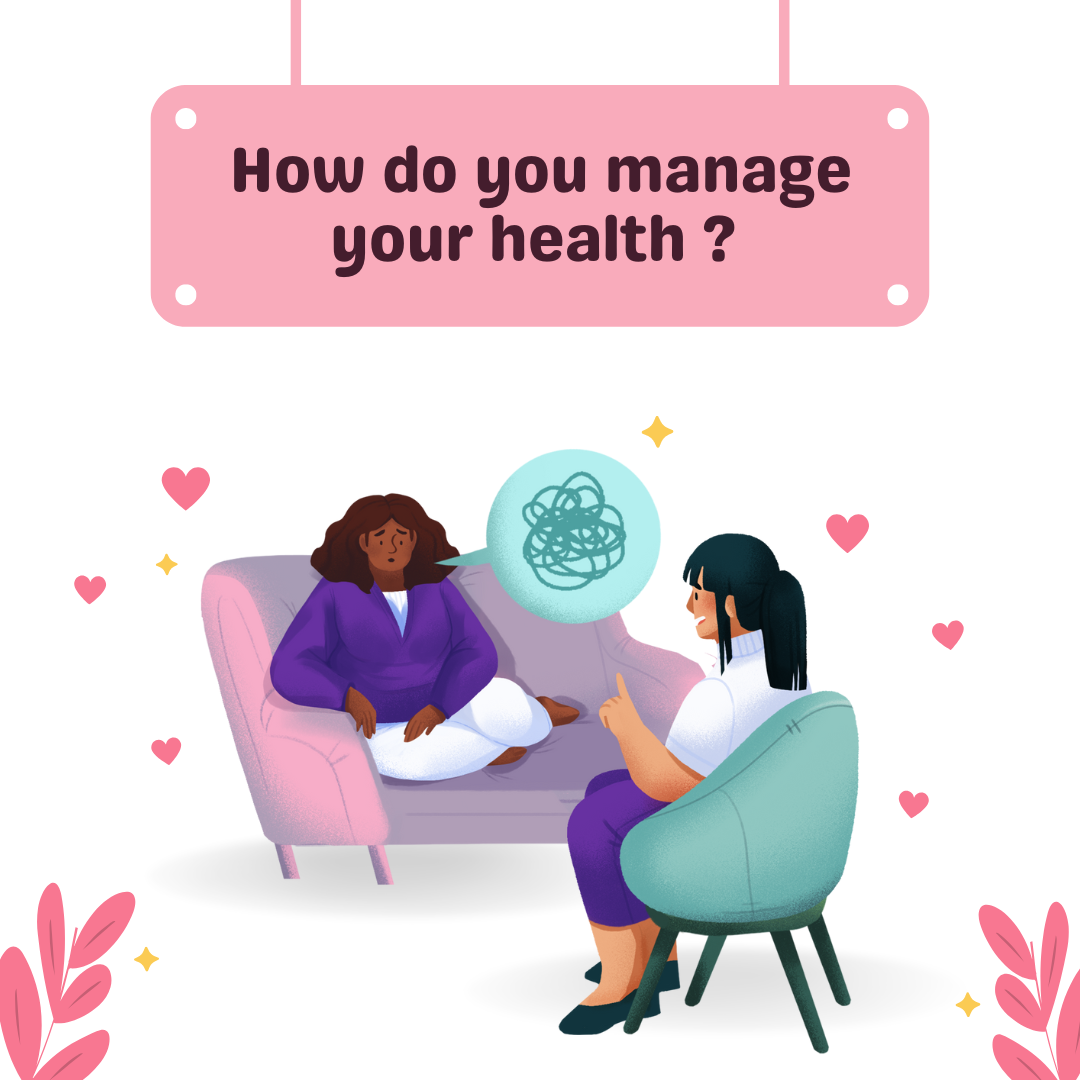Kavita: “You know, it seems like every day I’m dealing with some kind of health issue.”
Krishna: “Yeah, I know what you mean. It can be really frustrating to feel like you’re constantly battling something.”
Kavita: “Exactly. I feel like I’m always getting headaches, and my back has been really bothering me lately.”
Krishna: “Those are definitely common issues. Have you tried doing any exercises or stretches to help with your back pain?”
Kavita: “Yeah, I’ve been doing some yoga stretches, but I feel like I need to do more. And the headaches just won’t go away, no matter what I try.”
Krishna: “Hmm, have you been drinking enough water? Dehydration can sometimes cause headaches.”
Kavita: “I think I’ve been drinking enough, but maybe I need to pay more attention to that. And speaking of water, I’ve also been having some digestive issues lately.”
Krishna: “That could be related to your water intake as well. And what about your diet? Are you eating a lot of processed foods or sugary drinks?”
Kavita: “Yeah, I have been indulging in some junk food lately. Maybe I need to make some changes to my diet and see if that helps.”
Krishna: “That’s a good idea. And remember, taking care of your mental health is just as important as physical health. Have you been feeling stressed or anxious lately?”
Kavita: “Actually, now that you mention it, I have been feeling pretty stressed. Maybe that’s contributing to some of these other issues.”
Krishna: “It definitely could be. It’s important to take time for yourself and practice self-care to help manage stress and anxiety.”
Can you relate to the conversation?
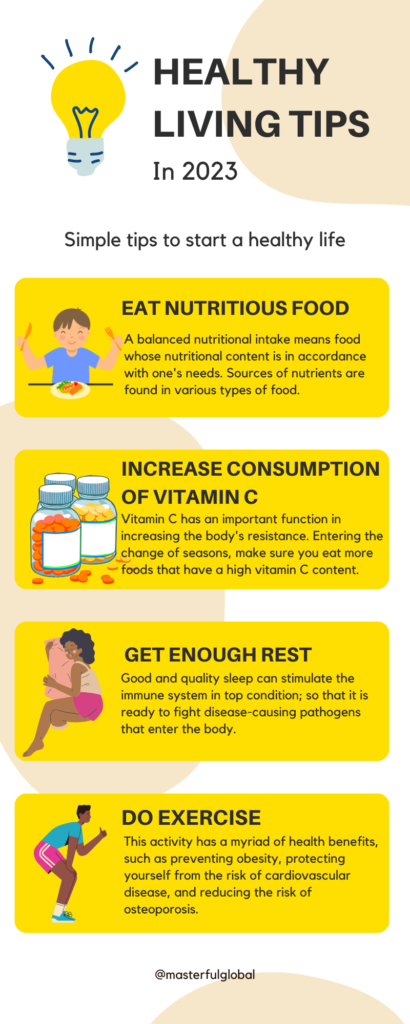
There are many common health problems that people face on a daily basis. Some of the most common include:
- Headaches: Headaches are one of the most common health complaints, and can be caused by a variety of factors such as stress, tension, dehydration, and lack of sleep.
- Back pain: Back pain is another common health issue, and can be caused by poor posture, lack of exercise, or injury.
- Fatigue: Many people struggle with fatigue on a daily basis, which can be caused by a variety of factors including lack of sleep, poor nutrition, and chronic stress.
- Digestive problems: Digestive issues such as constipation, bloating, and indigestion are common, and can be caused by factors such as poor diet, stress, and lack of exercise.
- Anxiety and depression: Mental health issues such as anxiety and depression are also common, and can be caused by a variety of factors including genetics, life events, and chronic stress.
- Allergies: Allergies, such as hay fever or food allergies, can cause a range of symptoms such as sneezing, itching, and hives.
- Skin problems: Skin problems such as acne, eczema, and psoriasis are also common, and can be caused by factors such as stress, poor nutrition, and hormonal imbalances.

Now, what are you doing about it?
Regular exercise is often touted as a solution to a wide range of health problems, and for good reason. It has been proven to be an effective way to prevent and manage a variety of diseases and health conditions, including cardiovascular disease, type 2 diabetes, and even some forms of cancer. But it’s not just physical health that benefits from exercise – it can also have a positive impact on mental health.
Exercise has been shown to be an effective way to reduce symptoms of depression, anxiety, and stress. When you exercise, your body releases endorphins, which are natural mood-boosters that can help reduce feelings of sadness, anxiety, and tension. In addition, exercise can help to reduce inflammation in the body, which has been linked to a range of mental health issues, including depression.
Regular exercise can also improve cognitive function, including memory, attention, and decision-making. Exercise has been shown to increase blood flow and oxygen to the brain, which can help to promote the growth of new brain cells and improve brain function. This can be particularly important as we age, as regular exercise has been linked to a reduced risk of cognitive decline and dementia.
Overall, exercise is a powerful tool for improving both physical and mental health. Whether you’re looking to prevent disease, manage a chronic health condition, or simply improve your mood and cognitive function, regular exercise is one of the best things you can do for your body and mind. So if you’re not already making exercise a regular part of your routine, it’s time to start!
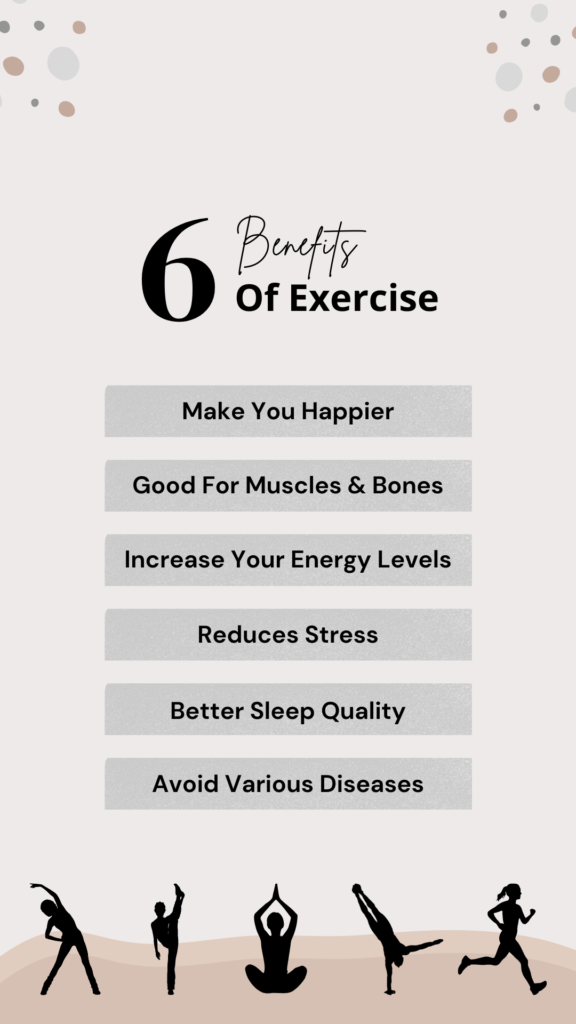
Here are 5 examples of diseases and how exercise can help to prevent or manage them:
- Cardiovascular disease: Exercise can help to improve heart health by lowering blood pressure, reducing inflammation, and improving cholesterol levels. The American Heart Association recommends at least 150 minutes of moderate-intensity aerobic exercise per week to reduce the risk of heart disease.
- Type 2 diabetes: Exercise can help to improve insulin sensitivity and glucose uptake, which can help to prevent or manage type 2 diabetes. A combination of aerobic exercise and strength training has been shown to be particularly effective in improving blood sugar control.
- Osteoporosis: Weight-bearing exercise, such as walking or strength training, can help to improve bone density and reduce the risk of osteoporosis. The National Osteoporosis Foundation recommends at least 30 minutes of weight-bearing exercise per day, five days per week.
- Depression: Exercise has been shown to be an effective way to reduce symptoms of depression by increasing the production of endorphins and other mood-boosting chemicals in the brain. The American Psychological Association recommends at least 30 minutes of moderate-intensity exercise per day to improve mental health.
- Arthritis: Exercise can help to reduce joint pain and stiffness associated with arthritis by improving joint flexibility and strength. Low-impact exercises such as swimming or cycling are often recommended for people with arthritis, as they put less stress on the joints while still providing a good workout.
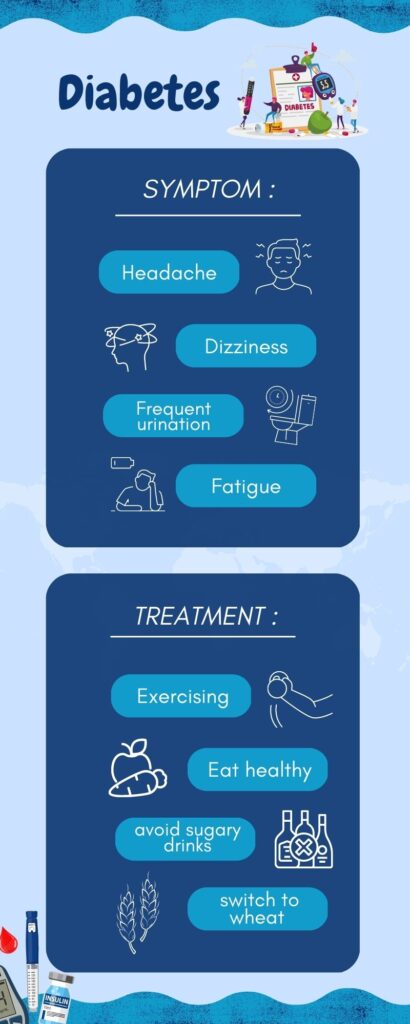
Here are a few more examples of health issues and how exercise can help:
Spondylitis: Exercise can help to improve posture, flexibility, and spinal mobility, which can be beneficial for people with spondylitis. Low-impact exercises such as swimming or yoga can be particularly helpful for reducing pain and inflammation.
Knee issues: Exercise can help to improve knee strength and stability, which can be beneficial for people with knee issues such as osteoarthritis or patellofemoral pain syndrome. Low-impact exercises such as cycling or using an elliptical machine can be effective for improving knee health without putting excessive stress on the joint.
Lack of confidence: Exercise can help to improve self-esteem and confidence by promoting a sense of accomplishment and providing a positive outlet for stress and anxiety. Engaging in physical activities that you enjoy, such as dancing or martial arts, can be a great way to boost confidence and improve overall well-being.
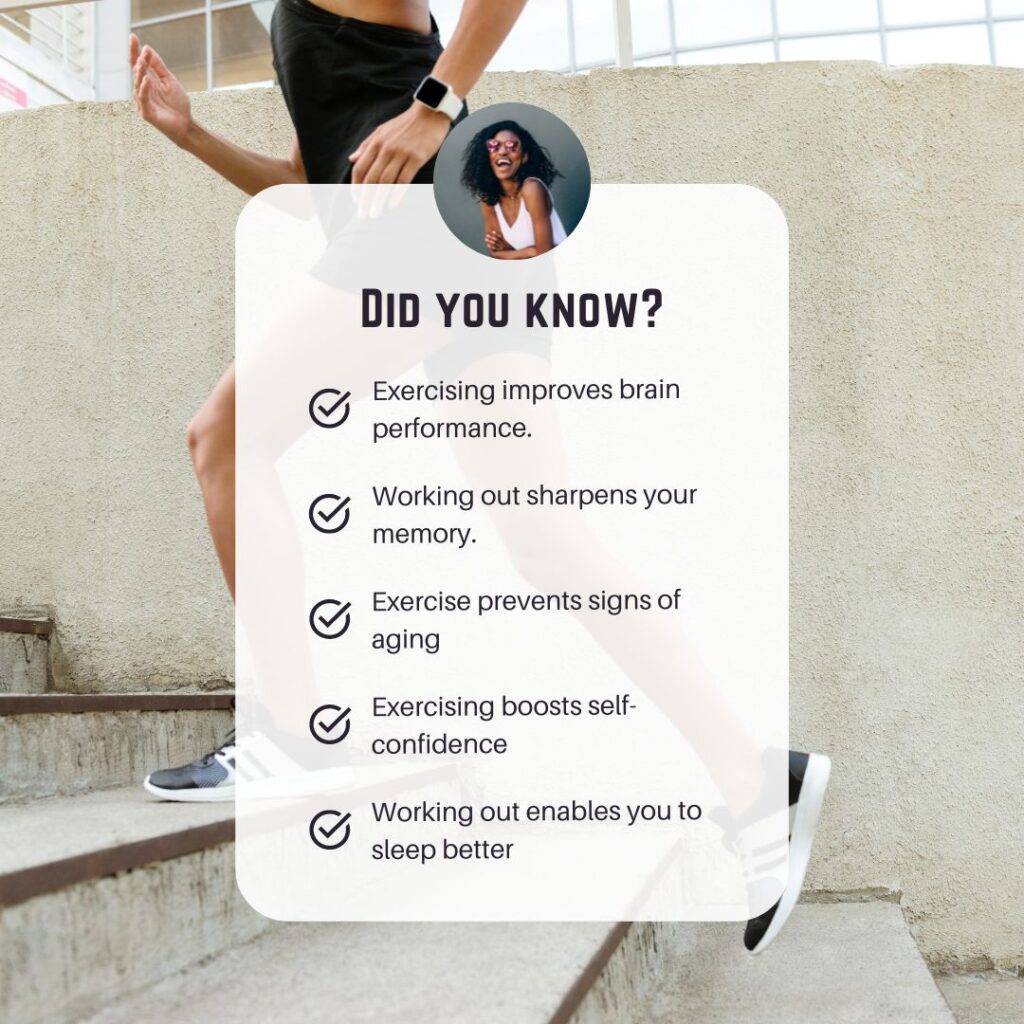
Self-doubt: Exercise can help to improve self-confidence by promoting a sense of accomplishment and providing a positive outlet for stress and anxiety. Regular exercise can also improve physical health and appearance, which can contribute to a more positive self-image.
Need for validation: Exercise can help to build self-esteem and reduce the need for external validation by promoting a sense of personal accomplishment and satisfaction. It can also provide an opportunity to connect with others who share similar interests and values.
Blaming people: Exercise can help to reduce stress and promote mental clarity, which can help individuals to take responsibility for their actions and avoid blaming others for their problems.
Insecurity: Exercise can help to improve self-confidence and promote a sense of personal empowerment by improving physical health, building strength and endurance, and promoting a sense of mastery over one’s body.
Unable to make decisions: Exercise can help to reduce stress and improve mental clarity, which can help individuals to make decisions more confidently and effectively. It can also provide a sense of accomplishment and satisfaction, which can boost self-confidence and promote a more positive outlook on life.

Visit the below links to reap the benefits !
http://www.masterfulglobal.com/uncategorized/reap-the-benefits-of-flexibility/
